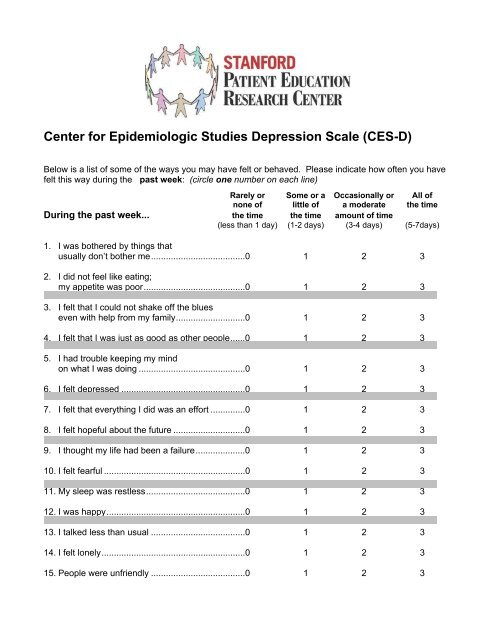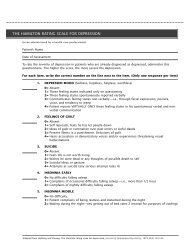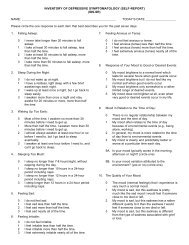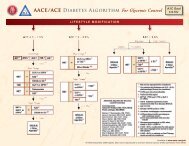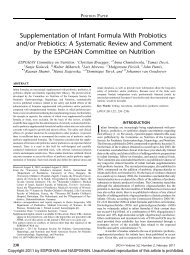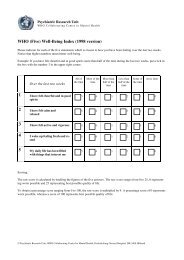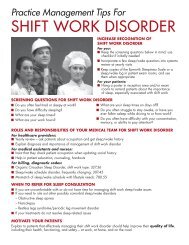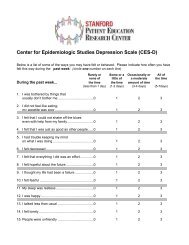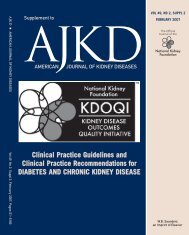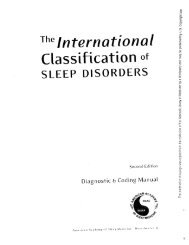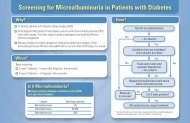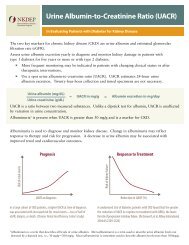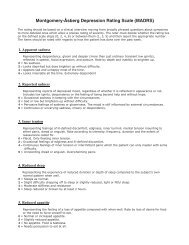Center for Epidemiologic Studies Depression Scale ... - myCME.com
Center for Epidemiologic Studies Depression Scale ... - myCME.com
Center for Epidemiologic Studies Depression Scale ... - myCME.com
You also want an ePaper? Increase the reach of your titles
YUMPU automatically turns print PDFs into web optimized ePapers that Google loves.
<strong>Center</strong> <strong>for</strong> <strong>Epidemiologic</strong> <strong>Studies</strong> <strong>Depression</strong> <strong>Scale</strong> (CES-D)<br />
Below is a list of some of the ways you may have felt or behaved. Please indicate how often you have<br />
felt this way during the past week: (circle one number on each line)<br />
Rarely or Some or a Occasionally or All of<br />
none of little of a moderate the time<br />
During the past week... the time the time amount of time<br />
(less than 1 day) (1-2 days) (3-4 days) (5-7days)<br />
1. I was bothered by things that<br />
usually don’t bother me......................................0 1 2 3<br />
2. I did not feel like eating;<br />
my appetite was poor.........................................0 1 2 3<br />
3. I felt that I could not shake off the blues<br />
even with help from my family............................0 1 2 3<br />
4. I felt that I was just as good as other people......0 1 2 3<br />
5. I had trouble keeping my mind<br />
on what I was doing ...........................................0 1 2 3<br />
6. I felt depressed ..................................................0 1 2 3<br />
7. I felt that everything I did was an ef<strong>for</strong>t ..............0 1 2 3<br />
8. I felt hopeful about the future .............................0 1 2 3<br />
9. I thought my life had been a failure....................0 1 2 3<br />
10. I felt fearful .........................................................0 1 2 3<br />
11. My sleep was restless........................................0 1 2 3<br />
12. I was happy........................................................0 1 2 3<br />
13. I talked less than usual ......................................0 1 2 3<br />
14. I felt lonely..........................................................0 1 2 3<br />
15. People were unfriendly ......................................0 1 2 3
Rarely or Some or a Occasionally or All of<br />
none of little of a moderate the time<br />
During the past week... the time the time amount of time<br />
(less than 1 day) (1-2 days) (3-4 days) (5-7days)<br />
16. I enjoyed life.......................................................0 1 2 3<br />
17. I had crying spells ..............................................0 1 2 3<br />
18. I felt sad .............................................................0 1 2 3<br />
19. I felt that people disliked me ..............................0 1 2 3<br />
20. I could not "get going" ........................................0 1 2 3<br />
Scoring<br />
Item Weights<br />
Rarely or<br />
none of the<br />
time<br />
(less than 1<br />
day)<br />
Some of a<br />
little of the<br />
time<br />
(1-2 days)<br />
Occasionally<br />
or a<br />
moderate<br />
amount of<br />
the time<br />
(3-4 days)<br />
All of the<br />
time<br />
(5-7 days)<br />
Items 4, 8, 12, & 16 3 2 1 0<br />
All other items: 0 1 2 3<br />
Score is the sum of the 20 item weights. If more than 4 items are missing, do not score the scale. A<br />
score of 16 or greater is considered depressed.<br />
Characteristics<br />
Tested on 175 subjects.<br />
No. of<br />
items<br />
Observed<br />
Range<br />
Mean<br />
Standard<br />
Deviation<br />
Internal Consistency<br />
Reliability<br />
Test-Retest<br />
Reliability<br />
20 1-53 16.2 10.9 .91 NA<br />
Source of Psychometric Data<br />
Stan<strong>for</strong>d Arthritis Self-Management Study, 1996. Unpublished.<br />
Comments<br />
We are no longer using the CES-D in multiethnic studies because we have found that the norms <strong>for</strong><br />
various ethnic groups differ. This scale is available in Spanish.
References<br />
Radloff LS, The CES-D scale: A self-report depression scale <strong>for</strong> research in the general population.<br />
Applied Psychological Measurement, 1, 1977, pp.385-401.<br />
This scale is free to use without permission<br />
Stan<strong>for</strong>d Patient Education Research <strong>Center</strong><br />
1000 Welch Road, Suite 204<br />
Palo Alto CA 94304<br />
(650) 723-7935<br />
(650) 725-9422 Fax<br />
self-management@stan<strong>for</strong>d.edu<br />
http://patienteducation.stan<strong>for</strong>d.edu<br />
Funded by the National Institute of Nursing Research (NINR)
Checklist of Clinical Situations in Which Screening <strong>for</strong> a Major<br />
Depressive Episode Should Be Considered<br />
• Chronic pain or other somato<strong>for</strong>m illness<br />
• Endocrinologic illness (eg, diabetes, thyroid)<br />
• Post myocardial infarction<br />
• Post stroke<br />
• Presence of malignancy<br />
• Presence of other serious, chronic, or life-threatening illness (advanced diabetes,<br />
advanced COPD)<br />
• Substance abuse<br />
• Complaints of depressed mood, decreased interest, suicidal ideation<br />
• Chronic insomnia<br />
• Chronic fatigue<br />
• Recent trauma<br />
• Chronic unemployment<br />
• Recent loss of job
<strong>Depression</strong> Evaluation: Initial Visit<br />
Date:<br />
Age:<br />
Story of the Illness<br />
Name<br />
ROS<br />
circle positives<br />
PHQ-9<br />
Nerves<br />
Anhedonia<br />
_ _<br />
Headache<br />
Dysphoria<br />
_ _<br />
Pain<br />
Insomnia<br />
_ _<br />
Sex<br />
Tired<br />
_ _<br />
Tired<br />
Appetite<br />
_ _<br />
Health<br />
Failure<br />
_ _<br />
Sleep<br />
Concentration<br />
Slow/restless<br />
_ _<br />
_ _<br />
Current Medical History<br />
Weight<br />
Memory<br />
Death<br />
_ _<br />
Digestive<br />
Score<br />
Difficulty<br />
_ _<br />
_ _<br />
Constipation<br />
Bereaved<br />
Move<br />
Past Med Hx<br />
check positives<br />
CAD<br />
Thyroid<br />
V<br />
V<br />
Psychiatric History<br />
Abuse<br />
Job loss<br />
Pet<br />
CVA<br />
V<br />
Parkinson’s<br />
V<br />
Alcoholism<br />
V<br />
<strong>Depression</strong><br />
V<br />
Suicide<br />
Drug<br />
Cancer<br />
Sensory<br />
V<br />
V<br />
V<br />
V<br />
Medications<br />
Education<br />
/yrs.<br />
Employment<br />
Pain<br />
Dementia<br />
V<br />
V<br />
CAGE Questionnaire<br />
Anxiety<br />
Psych<br />
Manic<br />
Diabetes<br />
V<br />
V<br />
V<br />
V<br />
Positives (FHx, occup., habits, function)<br />
circle positives<br />
Cut down<br />
Annoyed<br />
Guilt<br />
Eye opener<br />
Fam Hx<br />
Dementia<br />
V<br />
Health Habits:<br />
Tobacco<br />
Parkinson’s<br />
V<br />
/pk-yrs.<br />
<strong>Depression</strong><br />
Stroke<br />
CAD<br />
V<br />
V<br />
V<br />
Alcohol<br />
/day<br />
Diabetes<br />
V<br />
Mental illness<br />
V<br />
Suicide<br />
V<br />
1 Tools May be copied without permission
Vital Signs BP P T Wt. lb Ht. in<br />
Eyes V nl conjunctiva & lids<br />
Pupils V pupils symmetrical, reactive<br />
Fundus V nl discs & pos elements<br />
ENT-External V no scars, lesions, masses<br />
Otoscopic V nl canals & tympanic membranes<br />
Hearing V nl to _ ________<br />
Intranasal V nl mucosa, septum, turbinate<br />
Ant. Oral V nl lips, teeth, gums<br />
Oropharynx V nl tongue, palate, pharynx<br />
Neck palp. V symmetrical without masses<br />
Thyroid V no enlargement or tenderness<br />
Resp. ef<strong>for</strong>t V nl without retractions<br />
Chest percuss. V no dullness or hyperresonance<br />
Chest palp. V no fremitus<br />
Auscultation V nl bilateral breath sounds w/o rales<br />
Heart palp. V nl location, size<br />
Cardiac ausc. V no murmur, gallop, or rub<br />
Carotids V nl intensity w/o bruit<br />
Pedal pulses V nl posterior tibial & dorsalis pedis<br />
MS Gait V nl gait & station<br />
Nails V no clubbing, cyanosis<br />
Check nl, circ abn ROM Strength Tone Abnormals<br />
VVVV<br />
Skin V nl to inspection & palpation<br />
Neurologic V nl alertness, attentive<br />
Cranial nerves V w/o gross deficit<br />
Coordination V nl rapid alternating movement<br />
DTR’s V symmetrical, __ (scale: 0-4+)<br />
Sensation V nl touch, proprioception<br />
MMSE<br />
Psych Orient’n V nl to day, mo, yr, time, location _ /10<br />
Registration V register 3 items _ _/3<br />
Attn/Calc V serial subtraction, world bckwd _ _/5<br />
Recall V recall 3 items _ _/3<br />
Language V nl nam’g, repit’n,<strong>com</strong>pr’n, read’g, rit’g _ _/8<br />
Visuospatial V copy design, clock _ _/1<br />
Knowledge V current/past presidents totals _ /30<br />
Mood V nl GDS GDS Score _ _/15<br />
Breasts V nl inspection & palpation GDS (circle positives)<br />
Abdomen V no masses or tenderness<br />
Satisfied Afraid Wonderful<br />
L/S V no liver/spleen<br />
Dropped Happy Worthless<br />
Hernia V no hernia identified<br />
Empty Helpless Energy<br />
Anus/rectal V no abnormality or masses<br />
Bored Stay home Hopeless<br />
Spirits Memory Others better<br />
GU male V nl to inspection & palpation<br />
Prostate V nl size w/o nodularity<br />
Better off dead<br />
Considered harming yourself<br />
GU female V external genitalia nl w/o lesions<br />
Int. inspection V nl bladder, urethra, & vagina<br />
Speech V nl rate, volume<br />
Cervix V nl appearance w/o discharge<br />
Thought cont. V logical, coherent<br />
Uterus V nl size, position, w/o tenderness<br />
Psychosis V no hallucinations, delusions<br />
Adnexa V no masses or tenderness<br />
Judgement V nl<br />
Lymphatic V nl neck & axillae<br />
Behavior V cooperative, appropriate<br />
Lymph other V<br />
Additional Description of positive findings:<br />
2 Tools May be copied without permission
Diagnostic Assessment<br />
Re<strong>com</strong>mendations<br />
Educational Materials<br />
V <strong>Depression</strong><br />
V How Do I Know If I’m Depressed<br />
V Evaluation of <strong>Depression</strong><br />
V Treatment of <strong>Depression</strong><br />
V Drug Treatment of <strong>Depression</strong><br />
V Mental Health Specialists<br />
V Taking Care of Yourself<br />
V What If I Don’t Feel Better<br />
3 Tools May be copied without permission
DSM-IV Criteria <strong>for</strong> Major Depressive Disorder<br />
Major Depressive Disorder is characterized by the presence of the majority of<br />
these symptoms:<br />
Source:<br />
• Depressed mood most of the day, nearly every day, as indicated by either<br />
subjective report (eg, feels sad or empty) or observation made by others<br />
(eg, appears tearful). (In children and adolescents, this may be<br />
characterized as an irritable mood.)<br />
• Markedly diminished interest or pleasure in all, or almost all, activities<br />
most of the day, nearly every day<br />
• Significant weight loss when not dieting or weight gain (eg, a change of<br />
more than 5% of body weight in a month), or decrease or increase in<br />
appetite nearly every day.<br />
• Insomnia or hypersomnia nearly every day<br />
• Psychomotor agitation or retardation nearly every day<br />
• Fatigue or loss of energy nearly every day<br />
• Feelings of worthlessness or excessive or inappropriate guilt nearly every<br />
day<br />
• Diminished ability to think or concentrate, or indecisiveness, nearly every<br />
day<br />
• Recurrent thoughts of death (not just fear of dying), recurrent suicidal<br />
ideation without a specific plan, or a suicide attempt or a specific plan <strong>for</strong><br />
<strong>com</strong>mitting suicide.<br />
American Psychiatric Association. Diagnostic and statistical manual of mental disorders. 4th edition. Washington, DC:<br />
American Psychiatric Association, 1994.
INVENTORY OF DEPRESSIVE SYMPTOMATOLOGY (SELF-REPORT)<br />
(IDS-SR)<br />
NAME: _______________________________________________________<br />
TODAY’S DATE __________________<br />
Please circle the one response to each item that best describes you <strong>for</strong> the past seven days.<br />
1. Falling Asleep:<br />
0 I never take longer than 30 minutes to fall<br />
asleep.<br />
1 I take at least 30 minutes to fall asleep, less<br />
than half the time.<br />
2 I take at least 30 minutes to fall asleep, more<br />
than half the time.<br />
3 I take more than 60 minutes to fall asleep, more<br />
than half the time.<br />
2. Sleep During the Night:<br />
0 I do not wake up at night.<br />
1 I have a restless, light sleep with a few brief<br />
awakenings each night.<br />
2 I wake up at least once a night, but I go back to<br />
sleep easily.<br />
3 I awaken more than once a night and stay<br />
awake <strong>for</strong> 20 minutes or more, more than half<br />
the time.<br />
3. Waking Up Too Early:<br />
0 Most of the time, I awaken no more than 30<br />
minutes be<strong>for</strong>e I need to get up.<br />
1 More than half the time, I awaken more than 30<br />
minutes be<strong>for</strong>e I need to get up.<br />
2 I almost always awaken at least one hour or so<br />
be<strong>for</strong>e I need to, but I go back to sleep<br />
eventually.<br />
3 I awaken at least one hour be<strong>for</strong>e I need to, and<br />
can't go back to sleep.<br />
4. Sleeping Too Much:<br />
0 I sleep no longer than 7-8 hours/night, without<br />
napping during the day.<br />
1 I sleep no longer than 10 hours in a 24-hour<br />
period including naps.<br />
2 I sleep no longer than 12 hours in a 24-hour<br />
period including naps.<br />
3 I sleep longer than 12 hours in a 24-hour period<br />
including naps.<br />
5. Feeling Sad:<br />
0 I do not feel sad<br />
1 I feel sad less than half the time.<br />
2 I feel sad more than half the time.<br />
3 I feel sad nearly all of the time.<br />
6. Feeling Irritable:<br />
0 I do not feel irritable.<br />
1 I feel irritable less than half the time.<br />
2 I feel irritable more than half the time.<br />
3 I feel extremely irritable nearly all of the time.<br />
7. Feeling Anxious or Tense:<br />
0 I do not feel anxious or tense.<br />
1 I feel anxious (tense) less than half the time.<br />
2 I feel anxious (tense) more than half the time.<br />
3 I feel extremely anxious (tense) nearly all of the<br />
time.<br />
8. Response of Your Mood to Good or Desired Events:<br />
0 My mood brightens to a normal level which<br />
lasts <strong>for</strong> several hours when good events occur.<br />
1 My mood brightens but I do not feel like my<br />
normal self when good events occur.<br />
2 My mood brightens only somewhat to a rather<br />
limited range of desired events.<br />
3 My mood does not brighten at all, even when<br />
very good or desired events occur in my life.<br />
9. Mood in Relation to the Time of Day:<br />
0 There is no regular relationship between my<br />
mood and the time of day.<br />
1 My mood often relates to the time of day<br />
because of environmental events (e.g., being<br />
alone, working).<br />
2 In general, my mood is more related to the time<br />
of day than to environmental events.<br />
3 My mood is clearly and predictably better or<br />
worse at a particular time each day.<br />
9A. Is your mood typically worse in the morning,<br />
afternoon or night (circle one)<br />
9B. Is your mood variation attributed to the<br />
environment (yes or no) (circle one)<br />
10. The Quality of Your Mood:<br />
0 The mood (internal feelings) that I experience is<br />
very much a normal mood.<br />
1 My mood is sad, but this sadness is pretty<br />
much like the sad mood I would feel if someone<br />
close to me died or left.<br />
2 My mood is sad, but this sadness has a rather<br />
different quality to it than the sadness I would<br />
feel if someone close to me died or left.<br />
3 My mood is sad, but this sadness is different<br />
from the type of sadness associated with grief<br />
or loss.
Please <strong>com</strong>plete either 11 or 12 (not both)<br />
11. Decreased Appetite:<br />
0 There is no change in my usual appetite.<br />
1 I eat somewhat less often or lesser amounts of<br />
food than usual.<br />
2 I eat much less than usual and only with<br />
personal ef<strong>for</strong>t.<br />
3 I rarely eat within a 24-hour period, and only<br />
with extreme personal ef<strong>for</strong>t or when others<br />
persuade me to eat.<br />
12. Increased Appetite:<br />
0 There is no change from my usual appetite.<br />
1 I feel a need to eat more frequently than usual.<br />
2 I regularly eat more often and/or greater<br />
amounts of food than usual.<br />
3 I feel driven to overeat both at mealtime and<br />
between meals.<br />
Please <strong>com</strong>plete either 13 or 14 (not both)<br />
13. Decreased Weight (Within the Last Two Weeks):<br />
0 I have not had a change in my weight.<br />
1 I feel as if I've had a slight weight loss.<br />
2 I have lost 2 pounds or more.<br />
3 I have lost 5 pounds or more.<br />
14. Increased Weight (Within the Last Two Weeks):<br />
0 I have not had a change in my weight.<br />
1 I feel as if I've had a slight weight gain.<br />
2 I have gained 2 pounds or more.<br />
3 I have gained 5 pounds or more.<br />
15. Concentration/Decision Making:<br />
0 There is no change in my usual capacity to<br />
concentrate or make decisions.<br />
1 I occasionally feel indecisive or find that my<br />
attention wanders.<br />
2 Most of the time, I struggle to focus my<br />
attention or to make decisions.<br />
3 I cannot concentrate well enough to read or<br />
cannot make even minor decisions.<br />
16. View of Myself:<br />
0 I see myself as equally worthwhile and<br />
deserving as other people.<br />
1 I am more self-blaming than usual.<br />
2 I largely believe that I cause problems <strong>for</strong><br />
others.<br />
3 I think almost constantly about major and minor<br />
defects in myself.<br />
17. View of My Future:<br />
0 I have an optimistic view of my future.<br />
1 I am occasionally pessimistic about my future,<br />
but <strong>for</strong> the most part I believe things will get<br />
better.<br />
2 I'm pretty certain that my immediate future (1-2<br />
months) does not hold much promise of good<br />
things <strong>for</strong> me.<br />
3 I see no hope of anything good happening to<br />
me anytime in the future.<br />
18. Thoughts of Death or Suicide:<br />
0 I do not think of suicide or death.<br />
1 I feel that life is empty or wonder if it's worth<br />
living.<br />
2 I think of suicide or death several times a week<br />
<strong>for</strong> several minutes.<br />
3 I think of suicide or death several times a day in<br />
some detail, or I have made specific plans <strong>for</strong><br />
suicide or have actually tried to take my life.<br />
19. General Interest:<br />
0 There is no change from usual in how<br />
interested I am in other people or activities.<br />
1 I notice that I am less interested in people or<br />
activities.<br />
2 I find I have interest in only one or two of my<br />
<strong>for</strong>merly pursued activities.<br />
3 I have virtually no interest in <strong>for</strong>merly pursued<br />
activities.<br />
20. Energy Level:<br />
0 There is no change in my usual level of energy.<br />
1 I get tired more easily than usual.<br />
2 I have to make a big ef<strong>for</strong>t to start or finish my<br />
usual daily activities (<strong>for</strong> example, shopping,<br />
homework, cooking or going to work).<br />
3 I really cannot carry out most of my usual daily<br />
activities because I just don't have the energy.<br />
21. Capacity <strong>for</strong> Pleasure or Enjoyment (excluding sex):<br />
0 I enjoy pleasurable activities just as much as<br />
usual.<br />
1 I do not feel my usual sense of enjoyment from<br />
pleasurable activities.<br />
2 I rarely get a feeling of pleasure from any<br />
activity.<br />
3 I am unable to get any pleasure or enjoyment<br />
from anything.
22. Interest in Sex (Please Rate Interest, not Activity):<br />
0 I'm just as interested in sex as usual.<br />
1 My interest in sex is somewhat less than usual<br />
or I do not get the same pleasure from sex as I<br />
used to.<br />
2 I have little desire <strong>for</strong> or rarely derive pleasure<br />
from sex.<br />
3 I have absolutely no interest in or derive no<br />
pleasure from sex.<br />
23. Feeling slowed down:<br />
0 I think, speak, and move at my usual rate of<br />
speed.<br />
1 I find that my thinking is slowed down or my<br />
voice sounds dull or flat.<br />
2 It takes me several seconds to respond to most<br />
questions and I'm sure my thinking is slowed.<br />
3 I am often unable to respond to questions<br />
without extreme ef<strong>for</strong>t.<br />
24. Feeling restless:<br />
0 I do not feel restless.<br />
1 I'm often fidgety, wring my hands, or need to<br />
shift how I am sitting.<br />
2 I have impulses to move about and am quite<br />
restless.<br />
3 At times, I am unable to stay seated and need<br />
to pace around.<br />
25. Aches and pains:<br />
0 I don't have any feeling of heaviness in my<br />
arms or legs and don't have any aches or<br />
pains.<br />
1 Sometimes I get headaches or pains in my<br />
stomach, back or joints but these pains are only<br />
sometime present and they don't stop me from<br />
doing what I need to do.<br />
2 I have these sorts of pains most of the time.<br />
3 These pains are so bad they <strong>for</strong>ce me to stop<br />
what I am doing.<br />
26. Other bodily symptoms:<br />
0 I don't have any of these symptoms: heart<br />
pounding fast, blurred vision, sweating, hot and<br />
cold flashes, chest pain, heart turning over in<br />
my chest, ringing in my ears, or shaking.<br />
1 I have some of these symptoms but they are<br />
mild and are present only sometimes.<br />
2 I have several of these symptoms and they<br />
bother me quite a bit.<br />
3 I have several of these symptoms and when<br />
they occur I have to stop doing whatever I am<br />
doing.<br />
27. Panic/Phobic symptoms:<br />
0 I have no spells of panic or specific fears<br />
(phobia) (such as animals or heights).<br />
1 I have mild panic episodes or fears that do not<br />
usually change my behavior or stop me from<br />
functioning.<br />
2 I have significant panic episodes or fears that<br />
<strong>for</strong>ce me to change my behavior but do not stop<br />
me from functioning.<br />
3 I have panic episodes at least once a week or<br />
severe fears that stop me from carrying on my<br />
daily activities.<br />
28. Constipation/diarrhea:<br />
0 There is no change in my usual bowel habits.<br />
1 I have intermittent constipation or diarrhea<br />
which is mild.<br />
2 I have diarrhea or constipation most of the time<br />
but it does not interfere with my day-to-day<br />
functioning.<br />
3 I have constipation or diarrhea <strong>for</strong> which I take<br />
medicine or which interferes with my day-to-day<br />
activities.<br />
29. Interpersonal Sensitivity:<br />
0 I have not felt easily rejected, slighted, criticized<br />
or hurt by others at all.<br />
1 I have occasionally felt rejected, slighted,<br />
criticized or hurt by others.<br />
2 I have often felt rejected, slighted, criticized or<br />
hurt by others, but these feelings have had only<br />
slight effects on my relationships or work.<br />
3 I have often felt rejected, slighted, criticized or<br />
hurt by others and these feelings have impaired<br />
my relationships and work.<br />
30. Leaden Paralysis/Physical Energy:<br />
0 I have not experienced the physical sensation<br />
of feeling weighted down and without physical<br />
energy.<br />
1 I have occasionally experienced periods of<br />
feeling physically weighted down and without<br />
physical energy, but without a negative effect<br />
on work, school, or activity level.<br />
2 I feel physically weighted down (without<br />
physical energy) more than half the time.<br />
3 I feel physically weighted down (without<br />
physical energy) most of the time, several hours<br />
per day, several days per week.<br />
Which 3 items (questions) were the easiest to understand _____________<br />
Thank you<br />
Range 0-84 Score: _________
Montgomery-Åsberg <strong>Depression</strong> Rating <strong>Scale</strong> (MADRS)<br />
The rating should be based on a clinical interview moving from broadly phrased questions about symptoms<br />
to more detailed ones which allow a precise rating of severity. The rater must decide whether the rating lies<br />
on the defined scale steps (0, 2, 4, 6) or between them (1, 3, 5) and then report the appropriate number.<br />
The items should be rated with regards to how the patient has done over the past week.<br />
1. Apparent sadness<br />
Representing despondency, gloom and despair (more than just ordinary transient low spirits),<br />
reflected in speech, facial expression, and posture. Rate by depth and inability to brighten up.<br />
0 = No sadness.<br />
2 = Looks dispirited but does brighten up without difficulty.<br />
4 = Appears sad and unhappy most of the time.<br />
6 = Looks miserable all the time. Extremely despondent<br />
2. Reported sadness<br />
Representing reports of depressed mood, regardless of whether it is reflected in appearance or not.<br />
Includes low spirits, despondency or the feeling of being beyond help and without hope.<br />
0 = Occasional sadness in keeping with the circumstances.<br />
2 = Sad or low but brightens up without difficulty.<br />
4 = Pervasive feelings of sadness or gloominess. The mood is still influenced by external circumstances.<br />
6 = Continuous or unvarying sadness, misery or despondency.<br />
3. Inner tension<br />
Representing feelings of ill-defined dis<strong>com</strong><strong>for</strong>t, edginess, inner turmoil, mental tension mounting to<br />
either panic, dread or anguish. Rate according to intensity, frequency, duration and the extent of<br />
reassurance called <strong>for</strong>.<br />
0 = Placid. Only fleeting inner tension.<br />
2 = Occasional feelings of edginess and ill-defined dis<strong>com</strong><strong>for</strong>t.<br />
4 = Continuous feelings of inner tension or intermittent panic which the patient can only master with some<br />
difficulty.<br />
6 = Unrelenting dread or anguish. Overwhelming panic.<br />
4. Reduced sleep<br />
Representing the experience of reduced duration or depth of sleep <strong>com</strong>pared to the subject's own<br />
normal pattern when well.<br />
0 = Sleeps as normal.<br />
2 = Slight difficulty dropping off to sleep or slightly reduced, light or fitful sleep.<br />
4 = Moderate stiffness and resistance<br />
6 = Sleep reduced or broken by at least 2 hours.<br />
5. Reduced appetite<br />
Representing the feeling of a loss of appetite <strong>com</strong>pared with when-well. Rate by loss of desire <strong>for</strong> food<br />
or the need to <strong>for</strong>ce oneself to eat.<br />
0 = Normal or increased appetite.<br />
2 = Slightly reduced appetite.<br />
4 = No appetite. Food is tasteless.<br />
6 = Needs persuasion to eat at all.
6. Concentration difficulties<br />
Representing difficulties in collecting one's thoughts mounting to an incapacitating lack of<br />
concentration. Rate according to intensity, frequency, and degree of incapacity produced.<br />
0 = No difficulties in concentrating.<br />
2 = Occasional difficulties in collecting one's thoughts.<br />
4 = Difficulties in concentrating and sustaining thought which reduced ability to read or hold a conversation.<br />
6 = Unable to read or converse without great difficulty.<br />
7. Lassitude<br />
Representing difficulty in getting started or slowness in initiating and per<strong>for</strong>ming everyday activities.<br />
0 = Hardly any difficulty in getting started. No sluggishness.<br />
2 = Difficulties in starting activities.<br />
4 = Difficulties in starting simple routine activities which are carried out with ef<strong>for</strong>t.<br />
6 = Complete lassitude. Unable to do anything without help.<br />
8. Inability to feel<br />
Representing the subjective experience of reduced interest in the surroundings, or activities that<br />
normally give pleasure. The ability to react with adequate emotion to circumstances or people is<br />
reduced.<br />
0 = Normal interest in the surroundings and in other people.<br />
2 = Reduced ability to enjoy usual interests.<br />
4 = Loss of interest in the surroundings. Loss of feelings <strong>for</strong> friends and acquaintances.<br />
6 = The experience of being emotionally paralysed, inability to feel anger, grief or pleasure and a <strong>com</strong>plete<br />
or even painful failure to feel <strong>for</strong> close relatives and friends.<br />
9. Pessimistic thoughts<br />
Representing thoughts of guilt, inferiority, self-reproach, sinfulness, remorse and ruin.<br />
0 = No pessimistic thoughts.<br />
2 = Fluctuating ideas of failure, self-reproach or self- depreciation.<br />
4 = Persistent self-accusations, or definite but still rational ideas of guilt or sin. Increasingly pessimistic<br />
about the future.<br />
6 = Delusions of ruin, remorse or irredeemable sin. Self- accusations which are absurd and unshakable.<br />
10. Suicidal thoughts<br />
Representing the feeling that life is not worth living, that a natural death would be wel<strong>com</strong>e, suicidal<br />
thoughts, and preparations <strong>for</strong> suicide. Suicide attempts should not in themselves influence the rating.<br />
0 = Enjoys life or takes it as it <strong>com</strong>es.<br />
2 = Weary of life. Only fleeting suicidal thoughts.<br />
4 = Probably better off dead. Suicidal thoughts are <strong>com</strong>mon, and suicide is considered as a possible solution,<br />
but without specific plans or intenstion.<br />
6 = Explicit plans <strong>for</strong> suicide when there is an opportunity. Active preparations <strong>for</strong> suicide.<br />
© 1979 The Royal College of Psychiatrists. The Montgomery Åsberg <strong>Depression</strong> Rating <strong>Scale</strong> may be photocopied by individual researchers or clinicians<br />
<strong>for</strong> their own use without seeking permission from the publishers. The scale must be copied in full and all copies must acknowledge the following source:<br />
Montgomery, S.A. & Åsberg, M. (1979). A new depression scale designed to be sensitive to change. British Journal of Psychiatry, 134, 382-389. Written<br />
permission must be obtained from the Royal College of Psychiatrists <strong>for</strong> copying and distribution to others or <strong>for</strong> republication (in print, online or by any<br />
other medium).
QUICK INVENTORY OF DEPRESSIVE SYMPTOMATOLOGY (SELF-<br />
REPORT) (QIDS-SR 16)<br />
Please circle the one response to each item that best describes you <strong>for</strong> the past seven days.<br />
1. Falling asleep:<br />
0 I never take longer than 30 minutes to fall asleep.<br />
1 I take at least 30 minutes to fall asleep, less than half the time.<br />
2 I take at least 30 minutes to fall asleep, more than half the time.<br />
3 I take more than 60 minutes to fall asleep, more than half the time.<br />
2. Sleep during the night:<br />
0 I do not wake up at night.<br />
1 I have a restless, light sleep with a few brief awakenings each night.<br />
2 I wake up at least once a night, but I go back to sleep easily.<br />
3 I awaken more than once a night and stay awake <strong>for</strong> 20 minutes or more, more than half the<br />
time.<br />
3. Waking up too early:<br />
0 Most of the time, I awaken no more than 30 minutes be<strong>for</strong>e I need to get up.<br />
1 More than half the time, I awaken more than 30 minutes be<strong>for</strong>e I need to get up.<br />
2 I almost always awaken at least one hour or so be<strong>for</strong>e I need to, but I go back to sleep<br />
eventually.<br />
3 I awaken at least one hour be<strong>for</strong>e I need to, and can’t go back to sleep.<br />
4. Sleeping too much:<br />
0 I sleep no longer than 7–8 hours/night, without napping during the day.<br />
1 I sleep no longer than 10 hours in a 24-hour period including naps.<br />
2 I sleep no longer than 12 hours in a 24-hour period including naps.<br />
3 I sleep longer than 12 hours in a 24-hour period including naps.<br />
5. Feeling sad:<br />
0 I do not feel sad.<br />
1 I feel sad less than half the time.<br />
2 I feel sad more than half the time.<br />
3 I feel sad nearly all of the time.<br />
6. Decreased appetite:<br />
0 There is no change in my usual appetite.<br />
1 I eat somewhat less often or lesser amounts of food than usual.<br />
2 I eat much less than usual and only with personal ef<strong>for</strong>t.<br />
3 I rarely eat within a 24-hour period, and only with extreme personal ef<strong>for</strong>t or when others<br />
persuade me to eat.
QUICK INVENTORY OF DEPRESSIVE SYMPTOMATOLOGY (SELF-<br />
REPORT) (QIDS-SR 16)<br />
Please circle the one response to each item that best describes you <strong>for</strong> the past seven days.<br />
7. Increased appetite:<br />
0 There is no change from my usual appetite.<br />
1 I feel a need to eat more frequently than usual.<br />
2 I regularly eat more often and/or greater amounts of food than usual.<br />
3 I feel driven to overeat both at mealtime and between meals.<br />
8. Decreased weight (within the last two weeks):<br />
0 I have not had a change in my weight.<br />
1 I feel as if I’ve had a slight weight loss.<br />
2 I have lost 2 pounds or more.<br />
3 I have lost 5 pounds or more.<br />
9. Increased weight (within the last two weeks):<br />
0 I have not had a change in my weight.<br />
1 I feel as if I’ve had a slight weight gain.<br />
2 I have gained 2 pounds or more.<br />
3 I have gained 5 pounds or more.<br />
10. Concentration/Decision making:<br />
0 There is no change in my usual capacity to concentrate or make decisions.<br />
1 I occasionally feel indecisive or find that my attention wanders.<br />
2 Most of the time, I struggle to focus my attention or to make decisions.<br />
3 I cannot concentrate well enough to read or cannot make even minor decisions.<br />
11. View of myself:<br />
0 I see myself as equally worthwhile and deserving as other people.<br />
1 I am more self-blaming than usual.<br />
2 I largely believe that I cause problems <strong>for</strong> others.<br />
3 I think almost constantly about major and minor defects in myself.<br />
12. Thoughts of death or suicide:<br />
0 I do not think of suicide or death.<br />
1 I feel that life is empty or wonder if it’s worth living.<br />
2 I think of suicide or death several times a week <strong>for</strong> several minutes.<br />
3 I think of suicide or death several times a day in some detail, or I have made specific plans <strong>for</strong><br />
suicide or have actually tried to take my life.
QUICK INVENTORY OF DEPRESSIVE SYMPTOMATOLOGY (SELF-<br />
REPORT) (QIDS-SR 16)<br />
Please circle the one response to each item that best describes you <strong>for</strong> the past seven days.<br />
13. General interest:<br />
0 There is no change from usual in how interested I am in other people or activities.<br />
1 I notice that I am less interested in people or activities.<br />
2 I find I have interest in only one or two of my <strong>for</strong>merly pursued activities.<br />
3 I have virtually no interest in <strong>for</strong>merly pursued activities.<br />
14. Energy level:<br />
0 There is no change in my usual level of energy.<br />
1 I get tired more easily than usual.<br />
2 I have to make a big ef<strong>for</strong>t to start or finish my usual daily activities (<strong>for</strong> example, shopping,<br />
homework, cooking or going to work).<br />
3 I really cannot carry out most of my usual daily activities because I just don’t have the energy.<br />
15. Feeling slowed down:<br />
0 I think, speak, and move at my usual rate of speed.<br />
1 I find that my thinking is slowed down or my voice sounds dull or flat.<br />
2 It takes me several seconds to respond to most questions and I’m sure my thinking is slowed.<br />
3 I am often unable to respond to questions without extreme ef<strong>for</strong>t.<br />
16. Feeling restless:<br />
0 I do not feel restless.<br />
1 I’m often fidgety, wringing my hands, or need to shift how I am sitting.<br />
2 I have impulses to move about and am quite restless.<br />
3 At times, I am unable to stay seated and need to pace around.
Scoring Instructions <strong>for</strong> the IDS-C 30 /IDS-SR 30<br />
and QIDS-C 16 /QIDS-SR 16<br />
IDS-C 30 /IDS-SR 30<br />
1. Score 28 of the 30 items.<br />
Score either item 11 or item 12, not both.<br />
Score either item 13 or item 14, not both.<br />
If both 11 and 12 (or 13 and 14) are <strong>com</strong>pleted by accident, score the highest of the<br />
two items.<br />
2. Sum the item scores <strong>for</strong> a total score. Total score range 0-84.<br />
QIDS-C 16 /QIDS-SR 16<br />
1. Enter the highest score on any 1 of the<br />
4 sleep items (1-4) ____<br />
2. Enter score on item 5 ____<br />
3. Enter the highest score on any 1 of the<br />
appetite/weight items (6-9)<br />
____<br />
4. Enter score on item 10 ____<br />
5. Enter score on item 11 ____<br />
6. Enter score on item 12 ____<br />
7. Enter score on item 13 ____<br />
8. Enter score on item 14 ____<br />
9. Enter the highest score on either of the<br />
2 psychomotor items (15 and 16) ____<br />
10. Sum the item scores <strong>for</strong> a total score.<br />
Total score range 0-27.<br />
____
THE HAMILTON RATING SCALE FOR DEPRESSION<br />
(to be administered by a health care professional)<br />
Patient’s Name<br />
Date of Assessment<br />
To rate the severity of depression in patients who are already diagnosed as depressed, administer this<br />
questionnaire. The higher the score, the more severe the depression.<br />
For each item, write the correct number on the line next to the item. (Only one response per item)<br />
1. DEPRESSED MOOD (Sadness, hopeless, helpless, worthless)<br />
0= Absent<br />
1= These feeling states indicated only on questioning<br />
2= These feeling states spontaneously reported verbally<br />
3= Communicates feeling states non-verbally—i.e., through facial expression, posture,<br />
voice, and tendency to weep<br />
4= Patient reports VIRTUALLY ONLY these feeling states in his spontaneous verbal and nonverbal<br />
<strong>com</strong>munication<br />
2. FEELINGS OF GUILT<br />
0= Absent<br />
1= Self reproach, feels he has let people down<br />
2= Ideas of guilt or rumination over past errors or sinful deeds<br />
3= Present illness is a punishment. Delusions of guilt<br />
4= Hears accusatory or denunciatory voices and/or experiences threatening visual<br />
hallucinations<br />
3. SUICIDE<br />
0= Absent<br />
1= Feels life is not worth living<br />
2= Wishes he were dead or any thoughts of possible death to self<br />
3= Suicidal ideas or gesture<br />
4= Attempts at suicide (any serious attempt rates 4)<br />
4. INSOMNIA EARLY<br />
0= No difficulty falling asleep<br />
1= Complains of occasional difficulty falling asleep—i.e., more than 1/2 hour<br />
2= Complains of nightly difficulty falling asleep<br />
5. INSOMNIA MIDDLE<br />
0= No difficulty<br />
1= Patient <strong>com</strong>plains of being restless and disturbed during the night<br />
2= Waking during the night—any getting out of bed rates 2 (except <strong>for</strong> purposes of voiding)<br />
Adapted from Hedlung and Vieweg, The Hamilton rating scale <strong>for</strong> depression, Journal of Operational Psychiatry, 1979;10(2):149-165.
6. INSOMNIA LATE<br />
0= No difficulty<br />
1= Waking in early hours of the morning but goes back to sleep<br />
2= Unable to fall asleep again if he gets out of bed<br />
7. WORK AND ACTIVITIES<br />
0= No difficulty<br />
1= Thoughts and feelings of incapacity, fatigue or weakness related to activities; work or<br />
hobbies<br />
2= Loss of interest in activity; hobbies or work—either directly reported by patient, or<br />
indirect in listlessness, indecision and vacillation (feels he has to push self to work or<br />
activities)<br />
3= Decrease in actual time spent in activities or decrease in productivity<br />
4= Stopped working because of present illness<br />
8. RETARDATION: PSYCHOMOTOR (Slowness of thought and speech; impaired ability<br />
to concentrate; decreased motor activity)<br />
0= Normal speech and thought<br />
1= Slight retardation at interview<br />
2= Obvious retardation at interview<br />
3= Interview difficult<br />
4= Complete stupor<br />
9. AGITATION<br />
0= None<br />
1= Fidgetiness<br />
2= Playing with hands, hair, etc.<br />
3= Moving about, can’t sit still<br />
4= Hand wringing, nail biting, hair-pulling, biting of lips<br />
10. ANXIETY (PSYCHOLOGICAL)<br />
0= No difficulty<br />
1= Subjective tension and irritability<br />
2= Worrying about minor matters<br />
3= Apprehensive attitude apparent in face or speech<br />
4= Fears expressed without questioning<br />
11. ANXIETY SOMATIC: Physiological con<strong>com</strong>itants of anxiety, (i.e., effects of autonomic<br />
overactivity, “butterflies,” indigestion, stomach cramps, belching, diarrhea, palpitations,<br />
hyperventilation, paresthesia, sweating, flushing, tremor, headache, urinary frequency).<br />
Avoid asking about possible medication side effects (i.e., dry mouth, constipation)<br />
0= Absent<br />
1= Mild<br />
2= Moderate<br />
3= Severe<br />
4= Incapacitating
12. SOMATIC SYMPTOMS (GASTROINTESTINAL)<br />
0= None<br />
1= Loss of appetite but eating without encouragement from others. Food intake<br />
about normal<br />
2= Difficulty eating without urging from others. Marked reduction of appetite and<br />
food intake<br />
13. SOMATIC SYMPTOMS GENERAL<br />
0= None<br />
1= Heaviness in limbs, back or head. Backaches, headache, muscle aches. Loss of energy<br />
and fatigability<br />
2= Any clear-cut symptom rates 2<br />
14. GENITAL SYMPTOMS (Symptoms such as: loss of libido; impaired sexual per<strong>for</strong>mance;<br />
menstrual disturbances)<br />
0= Absent<br />
1= Mild<br />
2= Severe<br />
15. HYPOCHONDRIASIS<br />
0= Not present<br />
1= Self-absorption (bodily)<br />
2= Preoccupation with health<br />
3= Frequent <strong>com</strong>plaints, requests <strong>for</strong> help, etc.<br />
4= Hypochondriacal delusions<br />
16. LOSS OF WEIGHT<br />
A. When rating by history:<br />
0= No weight loss<br />
1= Probably weight loss associated with present illness<br />
2= Definite (according to patient) weight loss<br />
3= Not assessed<br />
17. INSIGHT<br />
0= Acknowledges being depressed and ill<br />
1= Acknowledges illness but attributes cause to bad food, climate, overwork, virus, need<br />
<strong>for</strong> rest, etc.<br />
2= Denies being ill at all<br />
18. DIURNAL VARIATION<br />
A. Note whether symptoms are worse in morning or evening. If NO diurnal variation, mark none<br />
0= No variation<br />
1= Worse in A.M.<br />
2= Worse in P.M.<br />
B. When present, mark the severity of the variation. Mark “None” if NO variation<br />
0= None<br />
1= Mild<br />
2= Severe
19. DEPERSONALIZATION AND DEREALIZATION (Such as: Feelings of unreality;<br />
Nihilistic ideas)<br />
0= Absent<br />
1= Mild<br />
2= Moderate<br />
3= Severe<br />
4= Incapacitating<br />
20. PARANOID SYMPTOMS<br />
0= None<br />
1= Suspicious<br />
2= Ideas of reference<br />
3= Delusions of reference and persecution<br />
21. OBSESSIONAL AND COMPULSIVE SYMPTOMS<br />
0= Absent<br />
1= Mild<br />
2= Severe<br />
Total Score ______________<br />
Presented as a service by<br />
Glaxo Well<strong>com</strong>e Inc.<br />
Research Triangle Park, NC 27709<br />
Web site: www.glaxowell<strong>com</strong>e.<strong>com</strong><br />
© 1997 Glaxo Well<strong>com</strong>e Inc. All rights reserved. Printed in USA. WEL056R0 February 1997
Psychiatric Research Unit<br />
WHO Collaborating Centre in Mental Health<br />
WHO (Five) Well-Being Index (1998 version)<br />
Please indicate <strong>for</strong> each of the five statements which is closest to how you have been feeling over the last two weeks.<br />
Notice that higher numbers mean better well-being.<br />
Example: If you have felt cheerful and in good spirits more than half of the time during the last two weeks, put a tick in<br />
the box with the number 3 in the upper right corner.<br />
Over the last two weeks<br />
All of<br />
the time<br />
Most of the<br />
time<br />
More than<br />
half of the<br />
time<br />
Less than<br />
half of the<br />
time<br />
Some of<br />
the time<br />
At no time<br />
1 I have felt cheerful and in good<br />
spirits<br />
5 4 3 2 1 0<br />
2 I have felt calm and<br />
relaxed<br />
5 4 3 2 1 0<br />
3 I have felt active and vigorous 5 4 3 2 1 0<br />
4 I woke up feeling fresh and rested<br />
5 4 3 2 1 0<br />
5 My daily life has been filled<br />
with things that interest me<br />
5 4 3 2 1 0<br />
Scoring:<br />
The raw score is calculated by totalling the figures of the five answers. The raw score ranges from 0 to 25, 0 representing<br />
worst possible and 25 representing best possible quality of life.<br />
To obtain a percentage score ranging from 0 to 100, the raw score is multiplied by 4. A percentage score of 0 represents<br />
worst possible, whereas a score of 100 represents best possible quality of life.<br />
© Psychiatric Research Unit, WHO Collaborating <strong>Center</strong> <strong>for</strong> Mental Health, Frederiksborg General Hospital, DK-3400 Hillerød
Interpretation:<br />
It is re<strong>com</strong>mended to administer the Major <strong>Depression</strong> (ICD-10) Inventory if the raw score is below 13 or if the patient<br />
has answered 0 to 1 to any of the five items. A score below 13 indicates poor wellbeing and is an indication <strong>for</strong> testing<br />
<strong>for</strong> depression under ICD-10.<br />
Monitoring change:<br />
In order to monitor possible changes in wellbeing, the percentage score is used. A 10% difference indicates a significant<br />
change (ref. John Ware, 1995).<br />
<br />
© Psychiatric Research Unit, WHO Collaborating <strong>Center</strong> <strong>for</strong> Mental Health, Frederiksborg General Hospital, DK-3400 Hillerød
Psychiatric Research Unit<br />
WHO Collaborating Centre in Mental Health<br />
WHO (Five) Well Being Index (1998 version)<br />
OMS (cinco) Indice de Bienestar (versión 1998)<br />
Por favor, indique para cada una de las cinco afirmaciones cual define mejor <strong>com</strong>o se ha sentido<br />
usted durante la últimas dos semanos. Observe que cifras mayores significan mayor bienestar.<br />
Ejemplo: Si se ha sentido alegre y de buen humor más de la mitad del tiempo durante las<br />
últimas dos semanas, marque una cruz en el recuadro con el número 3 en la esquina superior<br />
derecha.<br />
Durante las últimas<br />
dos semanas:<br />
Todo el<br />
tiempo<br />
La mayor<br />
parte del<br />
tiempo<br />
Más de la<br />
mitad del<br />
tiempo<br />
Menos de<br />
la mitad<br />
del<br />
tiempo<br />
De vez en<br />
cuando<br />
Nunca<br />
1. Me he<br />
sentido<br />
alegre y de<br />
buen humor<br />
2. Me he<br />
sentido<br />
tranquilo y<br />
relajado<br />
3. Me he<br />
sentido<br />
activo y<br />
enérgico<br />
4. Me he<br />
despertado<br />
fresco y<br />
descandado<br />
5. Mi vida<br />
cotidiana ha<br />
estado llena<br />
de cosas que<br />
me interesan<br />
5 4 3 2 1 0<br />
5 4 3 2 1 0<br />
5 4 3 2 1 0<br />
5 4 3 2 1 0<br />
5 4 3 2 1 0<br />
© Psychiatric Research Unit, WHO Collaborating <strong>Center</strong> <strong>for</strong> Mental Health, Frederiksborg General Hospital, DK-3400 Hillerød
Instrucciones de puntuación.<br />
Para calcular la punctuación, sume las cifras en la esquina superior derecha de los recuadros que<br />
usted marcó y multiplique la suma por quatro.<br />
Usted habrá obtenido una punctuación entre 0 y 100. Mayor punctuatión significa mayor bienestar.<br />
Interpretación:<br />
Se re<strong>com</strong>ienda administrar ”The Major <strong>Depression</strong> (ICD-10) Inventory” si la primera punctuación<br />
calculada es menor que 13 o si las respuestas del paciente oscilan entre 0 y 1 en cualquiera de las<br />
afirmaciones citadas. Una punctuación menor que 13 indica bajo bienestar y es un indicador para la<br />
aplicación del test de depresión (ICD-10).<br />
Cambios en el monitoreo:<br />
Para poder monitorear posibles cambios en el bienestar se usa la punctuación porcentual. Una<br />
diferencia de 10% indica un cambio significativo (ref. John Ware, 1996).<br />
© Psychiatric Research Unit, WHO Collaborating <strong>Center</strong> <strong>for</strong> Mental Health, Frederiksborg General Hospital, DK-3400 Hillerød
Achieve Remission in Adult Patients With Non-Psychotic<br />
Major Depressive Disorder:<br />
Algorithm<br />
• Initiate antidepressant at minimally-effective dose to optimize tolerability. Refer<br />
<strong>for</strong> cognitive-behavioral or interpersonal psychotherapy as available, especially<br />
<strong>for</strong> patients with severe MDD<br />
• After 4 weeks: is patient responding to treatment (eg, does he or she have a 50%<br />
or greater improvement in symptoms)<br />
o If yes, continue antidepressant therapy <strong>for</strong> additional 2 to 4 weeks at initial<br />
dose<br />
o If no or partial response, consider increasing the antidepressant dose,<br />
augmentation or <strong>com</strong>bination therapy, particularly if current<br />
antidepressant is well-tolerated. Consider adding psychotherapy if not<br />
already initiated.<br />
• Continue to monitor every 2 weeks<br />
• Once patient has achieved remission, continue same treatment at identical doses<br />
<strong>for</strong> additional 6 to 9 months. Consider adding psychotherapy if not already<br />
initiated.<br />
• If patient fails to respond to numerous treatment trials, per<strong>for</strong>m diagnostic reassessment.<br />
Consider somatic therapies (electroconvulsive therapy, repetitive<br />
transcranial magnetic stimulation, deep brain stimulation).
Consider Referring Patient With A Major Depressive Episode to Specialty Care If:<br />
• The presence of severe suicidal ideation is determined<br />
o Plan to <strong>com</strong>mit suicide<br />
o Means have been secured<br />
o Several risk factors (terminal illness, chronic illness, chronic pain,<br />
presence of substance or alcohol use disorder, presence of hopelessness,<br />
history of suicide attempt, patient reporting few or no reasons to live)<br />
o Few protective factors (patient reports several reasons to live, patient<br />
engaged in therapy)<br />
• Presence of homicidal ideation<br />
• Presence of psychotic symptoms<br />
• Current or history of mania/hypomania.<br />
• Presence of severe axis-I or axis-II/cluster B co-morbidity<br />
• History of treatment failure to more than two antidepressants in the current<br />
episode<br />
• Patient preference
Checklist <strong>for</strong> When to Consider Switching/Augmenting Antidepressants<br />
• Consider augmentation/<strong>com</strong>bination/dose increase over switching<br />
when:<br />
__ There has been a partial response to the current antidepressant<br />
__ The current antidepressant is well-tolerated<br />
__ There is a wish to avoid withdrawal symptoms<br />
__ There is a desire to target side-effects of current antidepressant<br />
with an adjunctive agent<br />
__ Patient preference<br />
• Consider switching over augmentation/<strong>com</strong>bination/dose increase<br />
when:<br />
__ There is no response to the current antidepressant<br />
__ There is a desire to simplify the pharmacologic regimen<br />
(cost, <strong>com</strong>pliance)<br />
__ There is a desire to avoid drug-drug interactions<br />
__ Patient preference
<strong>Depression</strong> Action Plan<br />
Is your depression <strong>com</strong>ing back<br />
Know the signs. Make a plan.<br />
Doing<br />
Great<br />
Caution<br />
<strong>Depression</strong><br />
is back<br />
You are:<br />
• Sleeping well<br />
• Eating well<br />
• Able to do your usual<br />
activities<br />
• Feeling OK<br />
You may be:<br />
• Not sleeping well or<br />
sleeping too much<br />
• Not eating enough or<br />
eating too much<br />
• Not able to do your usual<br />
activities<br />
You may:<br />
• Feel depressed or<br />
angry most of the time<br />
• Not be able to:<br />
- do your work<br />
- take care of things at<br />
home<br />
- get along with others<br />
Follow your treatment plan<br />
Other Instructions:<br />
• Call your doctor to set up<br />
a visit<br />
• Follow your treatment<br />
plan<br />
• Call your doctor or talk<br />
therapist now<br />
• If you have a plan to<br />
hurt yourself or<br />
someone else AND<br />
think you might act on<br />
it CALL 911 or go to the<br />
Emergency Room now<br />
_____________________________________________________________________<br />
Doctor:___________________________________ Phone: _________________________<br />
Talk Therapist:____________________________ Phone: _________________________<br />
The MaineHealth® Family June 2005<br />
www.mainehealth.org
<strong>Depression</strong> Monitoring Flow Sheet #1<br />
Patient name _________________________<br />
DOB/age _____________<br />
Date of diagnosis _____________________<br />
Date/type of<br />
contact<br />
Assessment of progress: Score 1 if symptoms are worse; Score 2 if there is no change in<br />
symptoms; Score if symptoms have improved<br />
Rating scale<br />
used/score<br />
Thoughts of<br />
death of suicidal<br />
ideation<br />
Patient<br />
impression of<br />
progress<br />
New stressors<br />
Other concerns<br />
of assessments<br />
Assessment of Treatment<br />
Current<br />
medication<br />
Medication<br />
<strong>com</strong>pliance<br />
Patient<br />
impression of<br />
progress<br />
Medication side<br />
effects<br />
Psychotherapy<br />
Provider initials
<strong>Depression</strong> Monitoring Flow Sheet #2<br />
Patient name _________________________<br />
DOB/age _____________<br />
Date of diagnosis _____________________<br />
Scoring guide: 1 = poor/no change in symptoms<br />
2 = OK/some improvement in symptoms<br />
3 = good/much improved<br />
Date/type of contact<br />
Mood<br />
Interest in activities<br />
Appetite<br />
Sleep<br />
Psychomotor<br />
agitation/lethargy<br />
Energy level<br />
Concentration<br />
Thoughts of<br />
death/suicide ideation<br />
Patient impression of<br />
progress<br />
Medication side effects<br />
Other<br />
concerns/assessments<br />
Provider initials
eMPR is a <strong>com</strong>piled database of over 4,000 concise and up-to-date drug monographs<br />
(OTC and Rx) from all of the Monthly Prescribing Reference publications (MPR,<br />
NPPR, PAPR, etc.)<br />
eMPR runs on desktops and laptops (Microsoft Windows XP or Vista), Palm,<br />
Blackberry and Windows Mobile<br />
To download, go to: http://www.empr.<strong>com</strong>/Download-eMPR/section/753/ and follow<br />
instructions.
PHQ-9 Flow Chart<br />
Tracking tool <strong>for</strong> PHQ-9 monitoring of depression response to treatment.<br />
Name<br />
Symptom<br />
Date Date Date Date Date Date Date Date<br />
Anhedonia<br />
Dysphoria<br />
Insomnia<br />
Tiredness<br />
Appetite<br />
Failure<br />
Concentration<br />
Slow/Restless<br />
Death/Suicide<br />
PHQ-9 Score<br />
Effect Question<br />
1 Tools May be copied without permission
Supportive Counseling Fact Sheet <strong>for</strong> Clinicians<br />
Some patients benefit from supportive counseling with the clinician and/or knowledgeable support staff.<br />
Counseling is provided in brief sessions using these techniques:<br />
• Active listening<br />
• Advice-giving<br />
• Adding perspective<br />
• Confirmation of appropriateness of patient concerns<br />
Focus on Solutions<br />
Empathize with the patient, while moving the dialogue towards the construction of clear, simple, specific<br />
behavioral change plans:<br />
• Work<br />
• Home<br />
• Finances<br />
• Health<br />
Focus on Coping Strategies<br />
Coping strategies can be divided into problem-focused, which are directed at situations that can be<br />
changed, and emotion-focused, which are directed that situations that cannot be changed. After helping a<br />
patient recognize whether a situation can be changed or not, some helpful coping strategies that may be<br />
suggested to patients are listed below.<br />
Problem-Focused<br />
Gather facts<br />
Use problem-solving techniques<br />
Notice negative thoughts and replace them<br />
Emotion-Focused<br />
Participate in pleasurable<br />
activities<br />
Participate in activities<br />
that boost<br />
Participate in activities<br />
that relax<br />
Process <strong>for</strong> Developing/Monitoring Coping Strategies<br />
1. Identify two to three coping strategies that may be helpful <strong>for</strong> the patient and clarify if the<br />
strategies will be consistent with their personality and lifestyle.<br />
2. Create a list of these coping strategies, giving one to the patient and the other to keep in the<br />
medical record.<br />
3. Have the patient keep track of both the problems and coping strategies that occur over the next<br />
week/couple of weeks. Have patient bring a summary to the next office visit.<br />
4. Assess coping strategies the patient used, rein<strong>for</strong>cing strategies that are effective and making<br />
suggestions when improvements are needed.
Tips <strong>for</strong> Improving Patient Adherence to Antidepressant Therapy<br />
• Educate patients about antidepressants upon prescribing<br />
o How we think they work<br />
o Their efficacy and the goal of therapy<br />
o The time-course of antidepressant response versus the time-course of sideeffects<br />
o Potential side-effects patients should anticipate<br />
o Eliciting <strong>for</strong> and dispelling myths (ie, addiction potential of<br />
antidepressants, etc)<br />
o Withdrawal effects upon abrupt discontinuation, especially if switching<br />
• Instruct patients on a plan of action if they experience intolerably or worrisome<br />
adverse events, as well as a protocol <strong>for</strong> contacting you<br />
• Follow patients frequently, especially when initiating a new therapy or increasing<br />
the dose<br />
• Always elicit <strong>for</strong> <strong>com</strong>mon side-effects, including sexual dysfunction<br />
• Target side-effects of therapy
Coping With Antidepressant Side Effects<br />
Antidepressants can cause unpleasant side effects. Many of these side effects<br />
last only a few weeks and then go away on their own. Even if a side effect<br />
doesn’t go away, you can learn ways to manage it. Don't stop taking your<br />
antidepressant or reduce the dosage without first talking to your doctor or mental<br />
health provider. Suddenly stopping can cause withdrawal-like health problems.<br />
Always tell your health care provider about your side effects, because some can<br />
be serious. Listed below are some coping strategies <strong>for</strong> the most <strong>com</strong>mon side<br />
effects of antidepressants.<br />
Nausea<br />
Nausea typically begins within a week of starting an antidepressant. It often goes<br />
away within a few weeks, when your body adjusts to the medication.<br />
Coping strategies<br />
• Take antidepressants with food<br />
• Eat smaller, more frequent meals<br />
• Suck on sugarless hard candy<br />
• Drink plenty of fluids, such as unsweetened fruit juice, cool water or ginger<br />
ale that's lost its carbonation<br />
• Try an antacid or bismuth subsalicylate (Pepto-Bismol)<br />
• Talk to your doctor about a dosage change or a slow-release <strong>for</strong>m of the<br />
medication<br />
Increased appetite, weight gain<br />
You may gain weight because of fluid retention, lack of physical activity, or<br />
development of a better appetite when your depression symptoms decrease.<br />
Bupropion (Wellbutrin) and certain selective serotonin reuptake inhibitors (SSRIs)<br />
are generally less likely to cause a lot of weight gain.<br />
Coping strategies<br />
• Eat healthy foods, such as plenty of fruits, vegetables and whole grains<br />
• Cut back on sweets, sugary drinks and fast foods<br />
• Try to exercise at least 30 minutes a day<br />
• Seek advice from a nutritionist or dietitian<br />
• Talk to your doctor about switching medications
Sexual Side Effects<br />
Sexual side effects include decreased desire (libido), erectile dysfunction,<br />
delayed ejaculation and decreased orgasm. These can last throughout treatment.<br />
Selective serotonin reuptake inhibitors (SSRIs) are more likely to cause sexual<br />
side effects, particularly delayed orgasm or inability to achieve orgasm<br />
(anorgasmia). Tricyclic antidepressants (TCAs) are more likely to cause erectile<br />
dysfunction.<br />
Coping strategies<br />
• Talk to your doctor about changing your dose.<br />
• Consider a medication that requires only a once-a-day dose, and schedule<br />
sexual activity be<strong>for</strong>e taking that dose<br />
• Talk to your doctor about adding or switching to an antidepressant that<br />
may counteract these effects, such as bupropion (Wellbutrin, Wellbutrin<br />
SR, Wellbutrin XL)<br />
• Talk to your doctor about taking a medication intended to directly treat<br />
sexual dysfunction<br />
• Talk to your doctor about a "drug holiday" — stopping medication <strong>for</strong> a day<br />
or so each week<br />
Fatigue, drowsiness<br />
Fatigue and drowsiness are <strong>com</strong>mon, especially during early weeks of treatment<br />
with antidepressants.<br />
Coping strategies<br />
• Take a brief nap during the day<br />
• Get some mild exercise, such as walking<br />
• Avoid driving or operating machinery until the fatigue passes<br />
• Take the medication one to two hours be<strong>for</strong>e bedtime
Insomnia<br />
Insomnia can result because some antidepressants give you an energy boost.<br />
While that may sound appealing, it can also make it difficult to get to sleep or<br />
stay asleep — and you may be tired during the day.<br />
Coping strategies<br />
• Take medication in the morning<br />
• Avoid caffeinated food and drinks<br />
• Get regular exercise at least four or five hours be<strong>for</strong>e bedtime<br />
• Develop a relaxing bedtime routine<br />
• Talk to your doctor about temporarily taking a sedating medication at<br />
bedtime<br />
Dry Mouth<br />
Dry mouth is a <strong>com</strong>mon side effect of antidepressants, such as tricyclic<br />
antidepressants (TCAs) that have anticholinergic effects — they block the action<br />
of the neurotransmitter acetylcholine. That, in turn, disrupts functioning of the<br />
digestive tract and other organ systems, reducing mucus and saliva secretions.<br />
Coping strategies<br />
• Sip water regularly<br />
• Suck on ice chips<br />
• Chew sugarless gum<br />
• Suck on sugarless hard candy<br />
• Breathe through your nose, not your mouth<br />
• Brush your teeth twice a day<br />
• Visit your dentist regularly to help prevent tooth decay<br />
• Talk to your doctor about saliva substitutes
Blurred vision<br />
Blurred vision is a <strong>com</strong>mon side effect, but it usually goes away on its own within<br />
a couple of weeks. It's usually associated with antidepressants, such as tricyclic<br />
antidepressants (TCAs) that block the neurotransmitter acetylcholine, which can<br />
dry out your eyes and cause blurriness.<br />
Coping strategies<br />
• Get an eye exam to rule out other causes of your eye problems<br />
• Talk to your doctor about using special eyedrops to relieve dryness<br />
• Talk to your doctor about a dose adjustment<br />
Constipation<br />
Constipation is often associated with tricyclic antidepressants (TCAs) because<br />
they block the neurotransmitter acetylcholine. That, in turn, disrupts normal<br />
functioning of the digestive tract and other organ systems.<br />
Coping strategies<br />
• Drink six to eight glasses of water daily.<br />
• Eat high-fiber foods, such as fresh fruits and vegetables, brans and whole<br />
grains.<br />
• Get regular exercise.<br />
• Take fiber supplements.<br />
• Consider taking stool softeners if other measures don't work.<br />
Dizziness<br />
Dizziness is more <strong>com</strong>mon with tricyclic antidepressants (TCAs) and monoamine<br />
oxidase inhibitors (MAOIs). These medications can cause low blood pressure,<br />
resulting in dizziness. This side effect is more <strong>com</strong>mon in older people.<br />
Coping strategies<br />
• Rise slowly from sitting or standing positions.<br />
• Use handrails, canes or other sturdy items <strong>for</strong> support.<br />
• Avoid driving or operating machinery.<br />
• Avoid caffeine, tobacco and alcohol.<br />
• Drink plenty of fluids.<br />
• Take medication at bedtime.
Agitation, restlessness, anxiety<br />
Agitation, restlessness and anxiety can result from the stimulating effect that<br />
some antidepressants have. Although having more energy may sound appealing,<br />
it may mean you can't relax or sit still even if you want to. Be alert <strong>for</strong> racing or<br />
impulsive thoughts along with high energy. If these develop, talk to your doctor<br />
right away because they may be signs of mood instability or another serious<br />
disorder.<br />
Coping strategies<br />
• Get vigorous exercise, such as jogging, biking or aerobics.<br />
• Practice deep-breathing exercises and muscle relaxation.<br />
• Consult your doctor about temporarily taking a relaxing medication<br />
Source: MayoClinic.<strong>com</strong>
How Do I Know If I’m Depressed<br />
What Does<br />
<strong>Depression</strong> Feel<br />
Like<br />
In the past month, have you had little interest or pleasure in<br />
doing things Are you feeling down, sad, or hopeless<br />
If the answer to either question is “yes,” you may suffer from<br />
depression. <strong>Depression</strong> is a feeling of sadness that lasts <strong>for</strong><br />
many weeks and does not go away. It interferes with your daily<br />
activities and may keep you from eating, sleeping, or enjoying<br />
yourself. You may also feel more tired than usual and have<br />
difficulty concentrating or remembering.<br />
<strong>Depression</strong> is not just "feeling blue" or "down in the dumps."<br />
It is not just being sad or feeling grief after a loss. <strong>Depression</strong> is<br />
a medical disorder — just like diabetes, high blood pressure, or<br />
heart disease — that day after day affects your thoughts,<br />
feelings, physical health, and behaviors.<br />
What Causes<br />
<strong>Depression</strong><br />
<strong>Depression</strong> is usually caused by low levels of special brain<br />
chemicals that change the way the brain sends messages. These<br />
brain chemicals can change as we get older, but they can also<br />
change after a time of stress, after a medical illness, or after<br />
taking certain medications.<br />
Like many medical disorders, depression has an effective<br />
treatment that can relieve the bad feelings and thoughts.<br />
Treatment is available from your family doctor.<br />
When Should I<br />
Seek Help<br />
If you think you or someone you know might have depression,<br />
seek help quickly. The longer treatment is delayed, the more<br />
difficult depression is to treat. Remember, depression is not<br />
caused by personal weakness, laziness, or lack of will power.<br />
It is a medical illness that can be treated.<br />
1 Tools May be copied without permission
Patient Satisfaction Survey<br />
We would like to know how you feel about the services we provide so we can make sure we are<br />
meeting your needs. Your responses are directly responsible <strong>for</strong> improving these services. All<br />
responses will be kept confidential and anonymous. Thank you <strong>for</strong> your time.<br />
Please rate our services (5-Almost Always, 1-Almost Never)<br />
Your Primary Care Provider<br />
Listens to you 5 4 3 2 1<br />
Takes enough time with you 5 4 3 2 1<br />
Explains what you want to know 5 4 3 2 1<br />
Gives you good advice and treatment 5 4 3 2 1<br />
Takes your symptoms and care seriously 5 4 3 2 1<br />
Is knowledgeable about depression 5 4 3 2 1<br />
Answers your questions 5 4 3 2 1<br />
Provides you with educational materials and<br />
other resources about depression<br />
5 4 3 2 1<br />
Other Providers in Our Practice that Help with Your Care<br />
Listens to you 5 4 3 2 1<br />
Takes enough time with you 5 4 3 2 1<br />
Explains what you want to know 5 4 3 2 1<br />
Gives you good advice and treatment 5 4 3 2 1<br />
Takes your symptoms and care seriously 5 4 3 2 1<br />
Is knowledgeable about depression 5 4 3 2 1<br />
Answers your questions 5 4 3 2 1<br />
Provides you with educational materials and<br />
other resources about depression<br />
5 4 3 2 1<br />
Please let us know in what areas we could improve:<br />
Adopted from the U.S. Department of Health and Human Services: Heath Resources and<br />
Services Administrations website: http://bphc.hrsa.gov/patientsurvey/samplesurvey.htm
Quick Facts About Psychological Counseling<br />
• In psychological counseling, patients with depression work with a qualified<br />
mental health care specialist who listens to them, talks, and helps them correct<br />
overly negative thinking about improve their relationships with others<br />
• Psychological counseling <strong>for</strong> depression does not mean talking about your<br />
childhood<br />
Treating <strong>Depression</strong> With Psychological Counseling<br />
Psychological counseling has been shown to be just as effective as antidepressant<br />
medication in treating many patients with depression. Psychological counseling can be<br />
done individually (only you and a mental health specialist), in a group (a mental health<br />
specialist, you, and other people with similar problems), or it can be family or marriage<br />
therapy where a mental health specialist, you and your spouse or family members<br />
participate. More than half of the people with mild to moderate depression respond well<br />
to psychological counseling. While the length of time that persons are involved in<br />
counseling differs, people with depression can typically expect to attend a weekly hourlong<br />
counseling session <strong>for</strong> 8-20 weeks. If your depression is not noticeable improved<br />
after 6-12 weeks of counseling, this usually means that you need to try a different<br />
treatment <strong>for</strong> your depression. Psychological counseling by itself is not re<strong>com</strong>mended as<br />
the only treatment <strong>for</strong> persons whose depression is more severe. Medication is needed <strong>for</strong><br />
this type of depression, and it can be taken in <strong>com</strong>bination with psychological counseling.<br />
What Can You Do to Help Your Clinician Most Effectively Treat Your <strong>Depression</strong><br />
With Psychological Counseling<br />
• Keep all of your appointments with the mental health specialist<br />
• Be honest and open, and ask questions<br />
• Work cooperatively with the mental health specialist (eg, <strong>com</strong>plete tasks assigned<br />
to you as part of the therapy)<br />
• Keep appointments with your primary care clinician and tell him/her how the<br />
therapy is working (eg, whether your depression is getting better or worse)<br />
Adapted from Rost K. <strong>Depression</strong> Tool Kit <strong>for</strong> Primary Care NIMH grant MH54444.
Self–Care Action Plan<br />
Setting goals and taking steps to reach them<br />
_________________________________________________________________________________________________________________<br />
Name: _______________________________ Date:______________________________<br />
Choose something you want to do, not something you think you should do.<br />
Set a goal you think you can meet.<br />
Think about the small steps you can take to help you reach your goal.<br />
My goal is ____________________________________________________________________<br />
I will make the following small change as I work toward my goal: __________________________<br />
_____________________________________________________________________________<br />
The things that could make it difficult to reach my goal are:<br />
My plan <strong>for</strong> over<strong>com</strong>ing these difficulties includes:<br />
Support/resources I will need to achieve my goal include:<br />
(For example: Is there a friend, family member, counselor or clergy member who might help you<br />
track success in meeting your goal)<br />
How important is it that I reach this goal ___________________<br />
(0 = not at all important; 10 = extremely important)<br />
How confident am I that I can achieve this goal ______________<br />
(0 = not at all confident; 10 = totally confident)<br />
Some types of activities to consider as you choose your goals:<br />
Exercise<br />
Socialize<br />
Eat Well<br />
Relax<br />
The MaineHealth ® Family January 2006<br />
www.mainehealth.org
Organizational Changes<br />
The strategy of organizational change according to the AHRQ’s report, Closing the Quality Gap 1 ,<br />
includes at least one of the following:<br />
1) Disease management or case management<br />
2) Team or personnel changes<br />
3) Communications, case discussions, and the exchange of treatment in<strong>for</strong>mation between<br />
distant health professionals<br />
4) Total Quality Management or Continuous Quality Improvement techniques<br />
Suggestions and Resources <strong>for</strong> Implementation:<br />
• Assign one healthcare provider in your office to handle all patients with MDD. Many<br />
practices have tried this strategy <strong>for</strong> other chronic diseases, like diabetes. Since one<br />
provider is responsible <strong>for</strong> that specific disease state, keeping up with the latest<br />
in<strong>for</strong>mation and standardizing the management of that disease can be<strong>com</strong>e more<br />
focused.<br />
• In conjunction with pharmacotherapy, psychotherapy is a first-line defense <strong>for</strong><br />
depression. Consider connecting with a psychotherapist <strong>for</strong> referrals and <strong>for</strong> questions. A<br />
search engine <strong>for</strong> psychotherapists in your area is available online at<br />
http://www.apahelpcenter.org/.<br />
• For more challenging cases or <strong>for</strong> questions about specific cases, being connected to a<br />
psychiatrist in your area can make asking those questions and making those referrals<br />
that much easier.
Strategies <strong>for</strong> Assisting Patients With Medication Management<br />
• Telephonic nurse case management to track visits and medication <strong>com</strong>pliance<br />
• Potential home visits <strong>for</strong> patients having difficulty <strong>com</strong>ing into the office<br />
• Web-based and telephone-based reminder systems that help patients remember<br />
their medication regimens<br />
• Having behavioral health practitioners on-site during certain hours of the week<br />
• Others that local medical practices may have identified that work well <strong>for</strong> their<br />
patients


